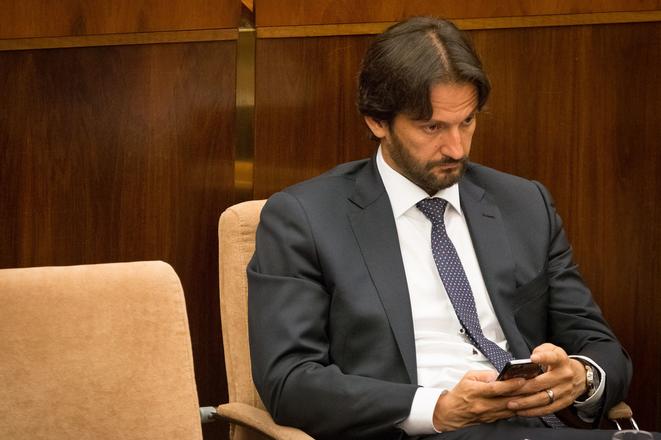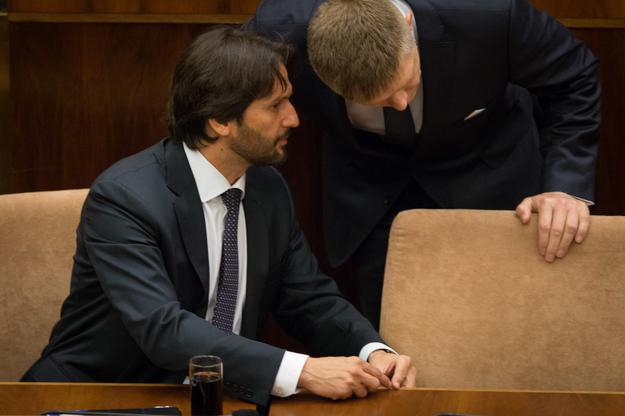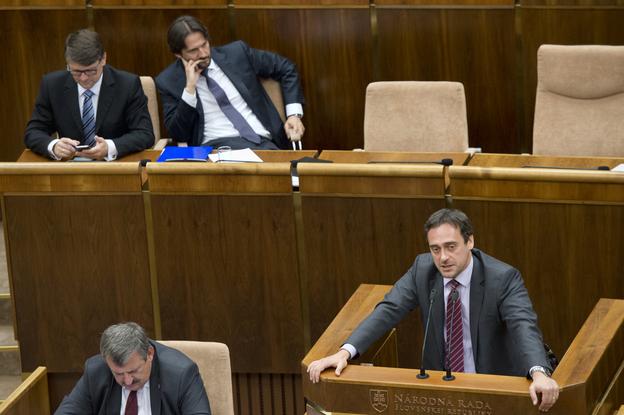As expected, only MPs of the opposition voted against Kaliňák, 58 out of the 138 present MPs. Deputies of the ruling coalition remained firm on the positions they announced before the vote and did not vote to oust Kaliňák from the ministerial chair. Of those present, 76 coalition MPs voted against the motion.
The session lasted the entire day on Tuesday, June 7. Even though only five MPs had applied to speak during the session prior to the vote, Kaliňák himself as well as the opposition MPs who proposed his dismissal entered the debate repeatedly unscheduled.
Even though Kaliňák survived the vote, which was also expected as all the coalition partners made it clear they wouldn’t vote with the opposition against the minister, the opposition insists there was a point in holding the session. Political analysts also agree that the motion was justified.
“The suspicions are strong enough for the opposition to attempt to express no confidence,” political analyst Pavol Baboš told The Slovak Spectator.
“We did promise a hundred days to the government for programme activities, but the cabinet will not have a hundred days for stealing and sweeping corruption scandals [under the carpet],” opposition MP Daniel Lipšic of the OĽaNO-NOVA party said, as quoted by the Sme daily.
“This is such a serious thing that it could be a reason to dismiss a minister even during the first hundred days,” opposition MP Miroslav Beblavý said in the parliament. “The motion to dismiss Robert Kaliňák would make sense anytime.”
Kaliňák, who began his third term as interior minister after the March 5 elections, was the subject of an extraordinary session in the parliament after the opposition collected 34 signatures for the motion to dismiss him over what they allege is his involvement in a corruption scandal, known to the public as the Bašternák case.
The Bašternák case
The case pertains to the excessive VAT refunds granted to businessman Ladislav Bašternák’s firm BL-202 which bought and sold seven apartments in the Five Star Residence complex built by tycoon Marián Kočner. Bašternák reportedly bought them for €12 million. The company then applied for a VAT refund of €2 million and the state paid it out, despite suspicions that the transaction was fictitious. The state later paid an additional €6 million in VAT refunds and saw no reason to verify them.
OĽaNO-NOVA leader Igor Matovič, who is one of the MPs behind the no-confidence motion, claims that Bašternák is close to not only Kaliňák but also to former transport minister Ján Počiatek (no longer in the government this term) and Prime Minister Robert Fico.
Matovič charged that Kaliňák has been interfering in the investigation.
“Kaliňák is directly responsible for the way the case has been investigated,” Matovič said. The case was closed with the conclusion that no fraud had been committed.
Fake bills in the plenum
The opposition repeatedly pointed to Kaliňák’s earlier claim that Bašternák paid for the seven apartments he purchased in the Five Star Residence in 2012 in cash because “it was the time of cash”.
OĽaNO-NOVA MPs even brought 24 shopping bags filled with fake 100-euro bills worth €12 million, and poured them over the speaker’s counter when Matovič was speaking to the plenum to show what such an amount of cash would look like and to make their point. Matovič said the bills altogether weighed about 120 kg and said it was absurd for someone to pay in this way, Sme reported.
“You are covering a fraud worth [money] that could have bought a hundred three-room flats,” Matovič said.
Before the session Lipšic promised he would provide further evidence of Kaliňák’s involvement with Bašternák. During the parliamentary debate he produced police records that he said prove that a higher-ranking police officer told two police officers who stopped Bašternák in his car while patrolling on Bratislava’s roads and wanted to give him a fine of €150 for violating traffic rules, to let the businessman be. This according to Lipšic happened in June 2012. Bašternák allegedly called someone asking them to deal with his problem. Following that, the police officers got the call from their superior telling them to let Bašternák drive away.
Despite that, the officers continued dealing with Bašternák and wanted to detain his driving licence. In the end Bašternák paid the fine.
“If Bašternák used his acquaintances to deal with his €150 fine, what would he do if tax returns worth millions were at stake? Or 12 years in jail? Who would he call?” Lipšic said.
Kaliňák responded to Lipšic’s speech saying that the documents were altered. He said he could prove the difference between the original police record and the one that Lipšic was reading from.
“That’s a classic work of our opposition that they work with documents that are not genuine and that they work with fakes,” Kaliňák said.
Kaliňák also charged that the only aim of the parliamentary session was Matovič’s attempts to deal with his personal problems with the minister, and to harm the current government.
“It’s a genuine revenge of Igor Matovič,” Kaliňák said, as quoted by Sme. “He presented me here as Satan. I cannot even comment on that.”
Fabricated, says Kaliňák
Kaliňák insisted even in his earlier responses to the announced attempt for a no-confidence vote that the accusations against him were fabricated, adding that it is nothing more than an effort to score political points. He stressed that he has never intervened in any investigation because such a course of action would be a violation of the Slovak constitution. He stated that the investigator is fully independent and that it is the prosecutor’s office that is overseeing the legality of the investigation, the TASR newswire wrote.

Prime Minister Robert Fico attended the parliament’s session too and was the first one to speak to the MPs. He voiced his full support to Kaliňák and labeled the opposition proposal to dismiss him “without proof and ungrounded”, Sme quoted him as saying.
“It’s unprecedented that a proposal to dismiss a cabinet member should be submitted within the 100-day period, and what’s more, based on fabricated facts that have nothing to do with reality,” Fico said as quoted by Sme.
Fico should move out
The opposition parties repeatedly called on Fico to move out of a flat which he reportedly rents from Bašternák. They also want him to present to the public the rental contract with Bašternák, as well as documents proving that he has been duly paying rent for the apartment, TASR wrote.
The Government’s Office responded with saying that Fico has already disclosed all the necessary information surrounding his rental contract with Bašternák.
Opposition MPs repeated their calls on Fico to move out of the Bonaparte complex also during the parliamentary session.

Sieť and Most won’t go against Kaliňák
The opposition parties also called on ruling Most-Híd and Sieť parties not to help Kaliňák with their votes in the parliament.
The coalition partners of Smer, however, did not express any intention to help dismiss Kaliňák – quite the contrary.
Deputy Parliament Speaker Andrej Hrnčiar of Sieť admitted the Bašternák case is serious and his party will insist that the police to investigate it, but at this point the opposition hasn’t shown any proof that Kaliňák was involved.
“The argument ‘I think’ won’t hold, I need proof,” Hrnčiar said, as quoted by Sme.
Most-Híd’s Justice Minister Lucia Žitňanská, who shortly after elections called for the Bašternák case to be properly investigated, now admitted that her party’s MPs will support Kaliňák in the parliament.
“It wouldn’t be a functioning coalition if it supported an opposition proposal to express no confidence in a coalition minister,” Žitňanská said, as quoted by Sme, and added that when problems surface, the solution should be other than obliging to an opposition proposal.
“I don’t question the fact that the whole Bašternák case stinks, but it is the responsibility of the police president,” she said as quoted by Sme and added that it is too early to draw conclusions that Kaliňák was involved.
Yet the police fall under the influence of Kaliňák, the interior minister.
This is a problem that was clear as the coalition was put together: that this kind of scandal will prove to be a problem for the coalition relations, and will expose former opposition parties Most and Sieť to criticism for changing their attitudes.
“Now they act as loyal parts of the ruling coalition, in line with the logic of the ruling coalition,” political analyst Grigorij Mesežnikov told The Slovak Spectator. Surely there is an agreement that any proposal to dismiss a minister wouldn’t be supported, he opined and pointed to the fact that both parties have admitted the Bašternák case is definitely not clean but they see no reason to vote against Kaliňák at this point.
The attitude of Most and Sieť was easy to predict, because they did not manage to oust Kaliňák from the government during the coalition talks and now they cannot really afford to break the coalition, Baboš said.
“But they should be able to very well explain to their voters why remaining in a coalition with Kaliňák brings more benefits than dismissing this person that they criticised so much in the past,” Baboš said. “And they are not doing very well in that regard I think.”
Radka Minarechová contributed to this story



 Interior Minister Robert Kaliňák (source: SITA)
Interior Minister Robert Kaliňák (source: SITA)
 Interior Minister Robert Kalinak with PM Robert Fico (source: SITA)
Interior Minister Robert Kalinak with PM Robert Fico (source: SITA)
 MP Jozef Rajtár (SaS) speaking at the parliamentary session. (source: TASR)
MP Jozef Rajtár (SaS) speaking at the parliamentary session. (source: TASR)